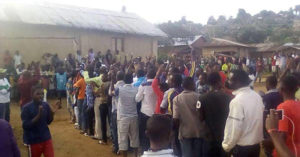The Congolese people are bracing for the results of the recent presidential election. Following a two-year delay in holding the highly anticipated election to unseat President Joseph Kabila, the people of the Democratic Republic of the Congo (DRC) finally got the chance to go to the polls on Dec 30. The lead up was not without its vicissitudes, as a one-week postponement was quickly followed by the exclusion of several opposition strongholds in Congo’s Ebola- and conflict-affected northeast, representing about 4% of the population.
The election took place amidst widespread allegations of irregularities and fraud, including voter tampering, voter suppression, and an array of technical and logistical issues. Despite being excluded from the presidential election just days before they were to take to the polls, the people of Beni came out in droves to vote in makeshift elections organized by youth activists determined to exercise their rights and have their voices heard.
While election day was relatively calm with minimal violence, the post-election period has, as expected, brought more dramatic turns:
- On Dec 31, the government shut down cellular telecommunications and internet services until the announcement of official results, citing security concerns.
- On Jan 2, President Trump deployed 80 troops to Gabon, within close reach of the DRC, in case post-election violence necessitated the evacuation of American citizens, personnel, and diplomatic facilities.
- On Jan 3, the Episcopal Council of the Congolese Catholic Church (CENCO)—which had 40,000 observers overseeing the elections in many of the country’s polling places—announced that their parallel vote tabulation showed that a single candidate had emerged as a clear winner. CENCO, widely regarded as credible in the DRC, said that whatever irregularities or problems it observed did not intervene with the Congolese peoples’ making a democratic choice. Though legally precluded from announcing a winner, the Catholic Church strongly insinuated that Kabila’s hand-picked successor, Emmanuel Ramazani Shadary, had not won. According to Jason Stearns of the Congo Research Group, “The Catholic Church has raised the stakes, stating clearly that they will publish what they consider to be true results of the elections and will defy the government if necessary,” Mr. Stearns said.”
- Also on Jan 3, the U.S. State Department threatened sanctions against Congo unless accurate results were published. “Those who undermine the democratic process, threaten the peace, security or stability of the D.R.C., or benefit from corruption may find themselves not welcome in the United States and cut off from the U.S. financial system,” a statement read.
- On Jan 4, the New York Times revealed that the Catholic Church determined Martin Fayulu as the rightful winner. Meanwhile, the UN Security Council met to discuss a response to the charged elections, but failed to agree on steps forward.
- On Sunday, Jan 6—the date results were supposed to be announced—the National Election Commission (CENI) postponed the official announcement of results, claiming that it had received fewer than 50 percent of the vote tally sheets.CENI is apparently preparing to release preliminary results at any moment.
- Riot police have been deployed to the electoral commission headquarters in Kinshasa amid fears of a disputed result.
The opposition is fracturing as mistrust grows among the main opposition leaders. While the Catholic Church has off-record pointed to Martin Fayulu—the clear front-runner in pre-election polls—as the winner, other sources have announced Felix Tshisekedi, the president of Congo’s largest opposition party, as the victor. Tshisekedi’s camp claims to have met with Kabila’s representatives to ensure a peaceful transfer through a power-sharing arrangement. This has caused Fayula and other oppositionists to suspect Tshisekendi, Kabila, and the electoral commission of colluding to manipulate the results in their favor.
Amidst these manifold maneuverings, with new delays or hiccups emerging daily, tensions are mounting. Failure to respect the election result will ineluctably plunge the country into a major political crisis. The electoral commission must declare the results transparently, in enough detail for their conclusions to be verified, and if necessary, challenged in court. Candidates must bridle their anger and mistrust and, instead, try to promote stability by urging supporters to remain calm and avoiding inflammatory statements.
The international community must remain vigilant and steadfast in its call for legitimacy and transparency in order to ensure the electoral commission does not attempt to manipulate results. Should there be any indication of impropriety, the U.S., African powers, and the U.N. Security Council must stand ready to call for thorough and credible investigations before those results are deemed definitive.
The government should immediately restore telecommunication networks and end unnecessary restrictions on the media, as called for by the UN Special Rapporteur on freedom of opinion and expression, longtime JWW ally David Kaye. Many international observers and local civil society organizations fear potential riots and political violence. An information vacuum not only breeds confusion in this chaotic period, but also precludes more rural areas from communicating their results to the electoral commission. Regardless of the results of the election’s outcome, the DRC’s security forces must respect the rights of all Congolese to freedom of assembly, peaceful protest and political expression.


